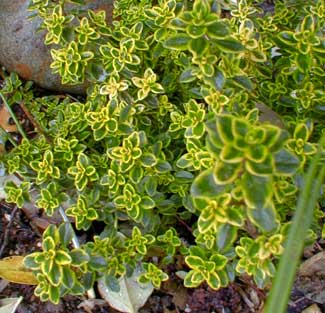
Gold Variegated Lemon Thyme
aka, German Thyme;
aka, Winter Thyme
"I know a bank
where the wild thyme blows."
-Shakespeare's
Oberon
Oberon
Variegated lemon thyme (Thymus citriodorus variegata) is one of the best year-round thymes. Hardy as thymes are, most are nevertheless unrpedictable for lasting beauty, & some of them just get awful looking after a couple of years & need to be started over. This can be caused by over watering, toxins in the environment blackening patches of the more sensitive thymes, damage from winter cold, or just wearing out with age. The reason a patch gets homely sometimes remains unknown, requiring experimentation with sundry varieties in sundry garden conditions over time.
By comparison, Lemon Thyme is more certainly reliable. It is sometimes called Winter Thyme for this feature of remaining a handsome thing right through winter, fully evergreen in USDA zone 8. In zone 5 it would die back in winter, but in most cases return in spring, just so long as its area didn't stay too wet in winter. In zone 4 it would need mulching to see it safely through the winter.
T. citriodorus (aka T. limoneum, aka T. serpyllum var citridorus) is not in reality a distinct species, but is a garden hybrid of T. pulegiodes x T. vulgaris. It does best in full sun, in well-draining soil.
It has small lavender-pink blooms in June & July. It has a semi-creeping partially upright habit. The tiny lemon-scented variegated leaves are green with yellow edging, more yellow on some strains than others. There are also cultivars of a silver-edged variant, T. citriodorus argenteus, which likewise varies in the amount of the pale portion of the leaves.
It is rarely taller than six or eight inches. Though small in stature, it is capable of considerable spread, & can even become a little weedy if it greatly loves its location. It can be restrained by harvesting it for the table, & is very amenable to being sheered for shape. If it is not harvested for its herbal value, it should nevertheless be sheered toward the end of winter so that its spring regrowth comes in perfectly renewed.
Besides being an ornamental beauty, it is a first-rate culinary thyme, the leaves tasting as great as they smell. It is often recommended for baked fish, in marinades, fried veggies, fruit salid, custards, & in just about anything that would call for a bit of lemon. As a tea it can be a healthful stimulant, its phenols having both anti-bacterial & caffein-like actions.